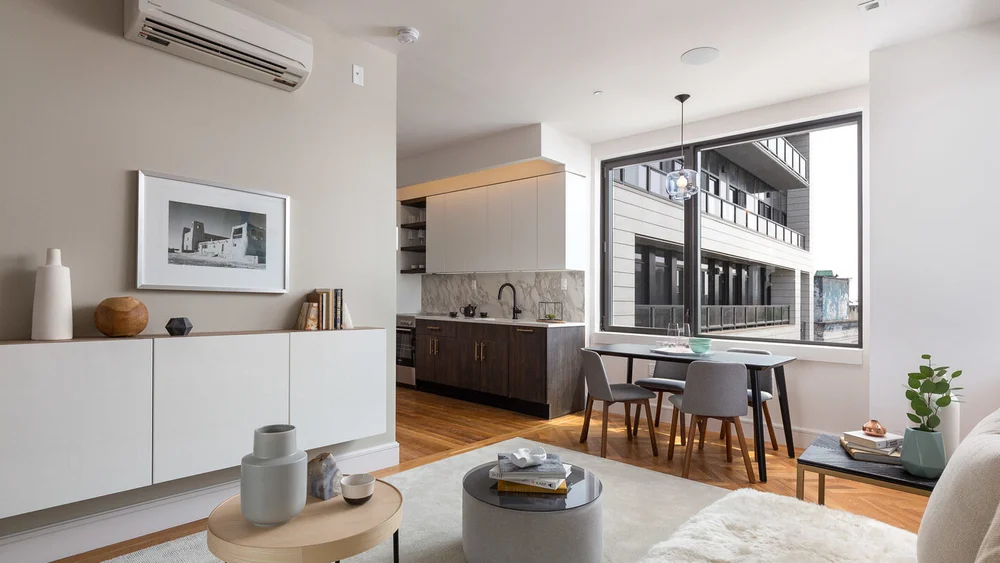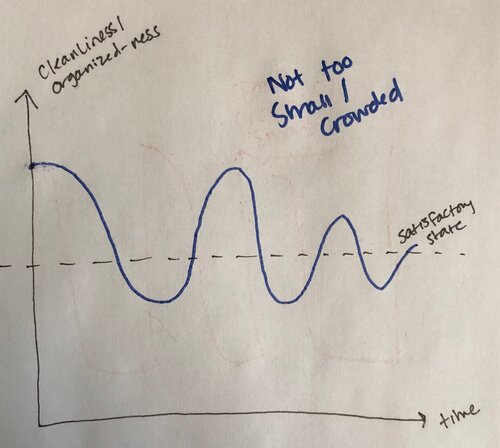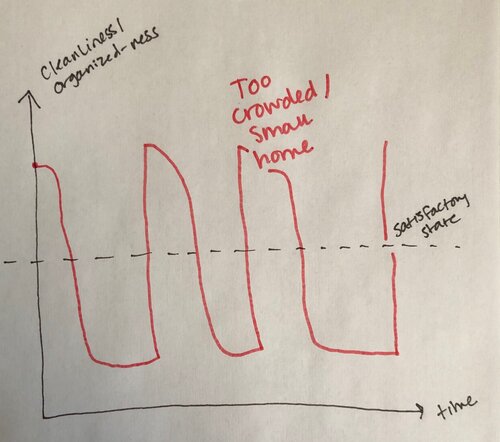How Homes Work: A Followup
How to avoid pitfalls when optimizing home-to-occupant fit.
Back in February, I published my explainer on How Homes Work.
Homes have less-noticed, higher purposes other than just holding our stuff and our bodies. First, homes project and establish claims about personal identity, both to others and the self. Second, homes serve as important modulators of mood.
At the time I was living in a 600-square foot 2-bedroom/1-bath apartment with my husband, 3 children, one dog, and one cat. It was ok for a while before the 3rd child joined us. But upon his learning to crawl, the trio of them had become a swarming horde. I found myself completely unable to manage our possessions, to maintain basic cleanliness, to work at home, or to relax.
In writing How Homes Work, I convinced myself of the absolute necessity of moving to a new apartment sooner rather than later. I found an apparently-perfect 3 bedroom/2.5-bath apartment in the same general area. We traded a new elevator building with lots of amenities for an ancient building, and doubled square footage to about 1200 for the same price.
This isn't another story about how getting what you want doesn't really make you happy. I am ECSTATIC. I immediately felt unbelievably more comfortable at home, and it's only getting better as we settle in.
I didn't become organized overnight when we moved here. In fact, having added a lot of pandemic provisions, the organizational challenge is worse than ever. Stress more generally.... not good. Not good at all. But it was unquestionably the right decision.
Pandemic lockdown is not exactly an ordinary time to stress-test one's new environment, but it has perhaps allowed insights about the change to develop even more rapidly than they otherwise would have, during an ordinary 3 months living at a new place. Since I have indeed developed some further observations about home fit and function since my original post, I offer them to you here.

Old apartment with the glaring morning light. Not my decor lol
Feature or bug?
Our old place was brand new, and we were the first occupants of the apartment. It featured oversized windows in every room, as newer buildings tend to have. "Natural light" is great, right?
Well, hold your horses. Natural light is great on paper, in real estate buzzword land. But do you actually like big windows? Are they really a plus? It depends.
For me, those windows meant glaring bright light every morning when I woke up earlier than desired to feed the baby and review our under-the-couch crumb and dust bunny situation: no thanks. After months of this trained me to dread facing the day, there was nothing I wanted less to see in the morning than a bright room. I think bright light like that even gives me headaches. (My first NYC apartment, a half-below-street-level studio with only 2 small windows, might have accidentally been perfect in this regard - I just didn't realize)
Our new apartment was converted at some point from an oversized 2-bedroom into 3 bedrooms, by the addition of a wall cutting off the street side of the living room from the interior. This makes the inner living room/kitchen kind of dark, with no windows of its own (possible illegally) - again, on paper kind of a drawback. But it suits us just fine. No glare, and I can walk around in my pajamas without the chance of anyone seeing me.
If you can find some usual drawback that's not just tolerable to you but actually a benefit, you'll come out way ahead in your search for home.
Incongruity
I'd never really understood the appeal of a quaint or rustic home. Newer buildings are sexier on the surface.
But it's hard to occupy a sexy new building in a coherent way if you're kind of cluttered or eclectic. It just doesn't match. Very new buildings with unusual architectural styles look and feel like they should be occupied by people with some manner of Instagram aesthetic.
Especially here in New York where buildings do tend to be so old, an older home has greater ability to serve as a relatively neutral backdrop for ordinary life. Perhaps in the suburbs an ordinary backdrop is a home 20-50 years old.
A home makes demands about whether it is itself an object of direct attention. Ignore these demands at your peril.
Housekeeping dynamics
A small space is quicker to clean, but also quicker to dirty. This is fine if the state of your home wiggles around a baseline level of cleanliness with few huge deviations.

However, in a small home with small children you get these wild fluctuations in cleanliness. It's clean for 5 minutes while everyone's asleep, then dirties immediately and stays that way without serious, deliberate cleaning effort.

Our new apartment, being so much larger, collects dust bunnies at what feels like a glacial pace. Plus, we don't sit around looking at all of them. They're in the hall, in the corners of the rooms away from main traffic. In a small enough home, there isn't anywhere off the beaten path - one false or cheeky move on the kids' part and you end up with yogurt in your bookshelves.
Functionality is non-obvious
It is very easy to miss just how functional a space is, without really thinking it through in detail (or living there). Sure, some homes have a bit less counter space, a space-saving (i.e. tiny) dishwasher, or oddly-shaped closets. But they still get counted in your head as "kitchen, dishwasher, 3 closets.
A few months after you attempt to fit your stuff into that home and live your life, the faults will begin to emerge. Limited counter space plus a small dishwasher means you have nowhere to put the dirty or wet dishes that you'll need to trade out more frequently. Oddly-shaped closets invite piles and heaps.
I'd added a portable clothes washer to our tiny old apartment, thinking that'd basically get it up to speed with our old full-size ones (super rare in NYC apartments). I knew I'd have to run more loads, and find a place to put the machine (non-trivial considerations).
But the burden of non-functionality is much more insidious: if it's hard to do dishes or wash your clothes or get dressed when the baby is asleep in that room or eat neatly in what is actually the living room, new social frictions arise hand over fist: "I was using that glass! you wore that for like 5 minutes! don't leave your gym shorts on the couch! stop splashing yogurt in the bookshelves!"
Money and stuff don't completely solve all your problems, but they're not nothing. Anyways, we didn't spend any more to get this apartment (aside from the overlap in rent to do it off lease), we just moved to a different tradeoff frontier. If the friction of doing the things you want and need to do at home is driving you crazy, it might largely be fixable if you're willing to give up something else.
Emotional proximity
I'm not prepared to put a number on this, but there's some context-dependent distance from other occupants of your home that feels like "on top of each other" and some other distance that feels like "moderately apart." Your own markers may vary: like being in separate rooms, on separate floors, out of earshot, etc.
As a mother of very young kids, I find it absolutely crucial to be able to achieve emotional distance from them without having to leave home. Otherwise, it's hard to achieve true relaxation: I'm either at home so close to my kids I can't get away from them psychologically, or I'm out in public at a coffee shop or coworking space - always "on." (Needless to say, during the pandemic, this is 10x important as before).
Happily, it didn't take a McMansion to achieve this emotional distance - just a narrow home with an inner hall. My girls sleep at the very front of the apartment, and my room is towards the back. I moved my baby boy into my husband's room, because hubby is able to ignore him during sleep in a way that I cannot (I notice every sigh, whimper, etc.)
All day, I'm out in the front of the apartment exerting effort physically and emotionally in the care of my kids. When evening comes, I shift towards the back to do other things and feel like someone else. I didn't realize how much some emotional distance was worth (a TON) until it was gone.
Problems: You can take them with you
Ok, so everything isn't exactly perfect though.
I'd imagined that we'd keep the kids out of the back of the new apartment, for instance. Of course, the 2 year old maniac uses our long hall as a runway to barrel down with her vehicles instead. We installed a baby gate with a pet door, but she figured out she can cram herself through it. New home, same maniac 2 year old.
I knew that getting the kids up and down a flight of steps would be hard compared to living in an elevator building, but it was actually even worse than I'd imagined at first - one or both of my daughters would scream or cry when the other opened the door, they'd shove each other, or refuse to keep going, etc. Just horrible. That has settled down thankfully, but getting from the apartment to the outdoors is a non-trivial task and will get harder again when my son wants to walk out. The form of the problem - wrangling 3 kids - can shift, but no home would completely solve it.
It's awful to feel like you literally cannot do the things you want to do, and quite another to be your own biggest, internalized obstacle. I have space at our new apartment for my arts and crafts stuff, but I'm still not spending as much time using it as I think I'd like. Although our new apartment does offer me the genuine possibility for relaxation, I'm still not what you would call "chill." These are better problems to have, though, than simple clutter-management ones.
Conclusion
I never took myself to be a home person - previously, I always just satisficed and got on with my life. But improving home/lifestyle/identity/mood fit can reap huge dividends completely apart from the bullshit scene of flashy real estate, home decor, etc.
If your home does not meet your needs, even your psychological ones, I urge you to consider your options. Even if you stay, it can be with some new appreciation for what's good about your home and why you like that more than the alternatives.
Pamela J. Hobart - Philosophical Life Coaching Newsletter
Join the newsletter to receive the latest updates in your inbox.